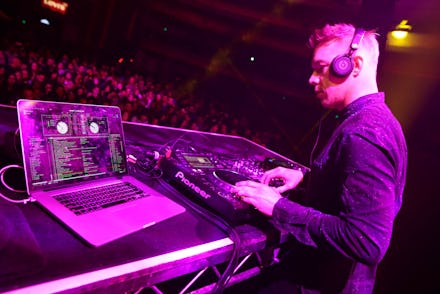This Machine Studied Over 10,000 Rap Songs to Do Something No Human Rapper Can

From the 808 drum machine to the digital sampler to autotune, computers have always had a strong behind-the-scenes presence in hip-hop, moreso than most genres. But they're always supplemental — the lyrics are always the centerpiece, and those are always human. That may be changing.
According to the Wall Street Journal, a research team out of Finland has created a computer program, which they've dubbed DeepBeat, that can essentially write its own rap verses by utilizing principles from the field of computational creativity to dissect a huge database of existing lyrics and rearrange them. And the raps are actually pretty good. Here's a taste:
How it works. If some of those lyrics felt familiar, that's because they are. "When you done let me know 'cause my love make you be like WHOA" is a Missy Elliott classic, and "All I know is I love you too much to walk away though" is from Eminem's "Love the Way You Lie." The computer operates by assembling lines from a database of 10,980 songs, compiled from over 104 rappers. It classifies the lines by theme — in this case "love" — and connects one to the other, attempting to maximize rhyming, structural similarity and semantic similarity.
The creators also used the algorithm to analyze which rappers have the most intricate rhyme patterns. Wu-Tang Clan's Inspectah Deck leads the pack, followed by Rakim (widely known for his pioneering use of internal rhyme), and Finnish rapper Redrama.
DeepBeat studies these rappers in order to maximize the amount of assonant rhymes it strings together in its verses. Assonant rhymes still might be the best measure of a rapper's skill, as they allow for complex multisyllabic rhymes — one of the most impressive tricks in a rapper's arsenal, according to Flocabulary. DeepBeat's creators boast in their paper, entitled "DopeLearning: A Computational Approach to Rap Lyrics Generation," that "in terms of quantitative rhyme density, the produced lyrics outperform best human rappers by 21%."
The gauntlet is officially down.
MC versus PC. Since DeepBeat doesn't have a voice synthesizer, it's unlikely to take over for any human MCs, at least for now. It also cannot flawlessly create a cohesive storyline in a verse without a human arranging the perfectly rhymed lines it pulls. Eric Malmi, a doctoral student at Aalto University and lead developer of DeepBeat, tells Mic they're looking into future improvements on the algorithm, though. "A fully automatic rap bot" is not outside the realm of possibility.
"In principle, I don't see why it would not be possible," Malmi told Mic. "Because a machine can hear and see in the same way a human can. The problem is how does the machine learn from this audio-visual input?" This is what the neural network models that DeepBeat utilizes were originally created for, Malmi said. "They're trying to mimic the way the human brain works and how it learns from the input it receives."
Google, Facebook and Microsoft are all working on developing neural network models. Siri is the most visible example. Siri's artificial intelligence allows it to learn from the input it receives to make its interactions more fluid, similar to the way DeepBeat learned to place complementary lyrics together. Malmi sees DeepBeat as aiding in these efforts, and it would likely have applications in creating more natural and pleasurable speech interactions between humans and machines before it renders all human rappers obsolete.
Though DeepBeat will likely never replace rappers, it has potential as a writing tool. Once perfected, DeepBeat could help rappers to maximize the rhyming potential of the verses they write and be used to workshop rhyme patterns and add depth.
If this happens, ghostwriting could soon become a thing of the past. Ghost-in-the-machine-writing will be the hot new controversy on the scene.
h/t MIT Technology Review